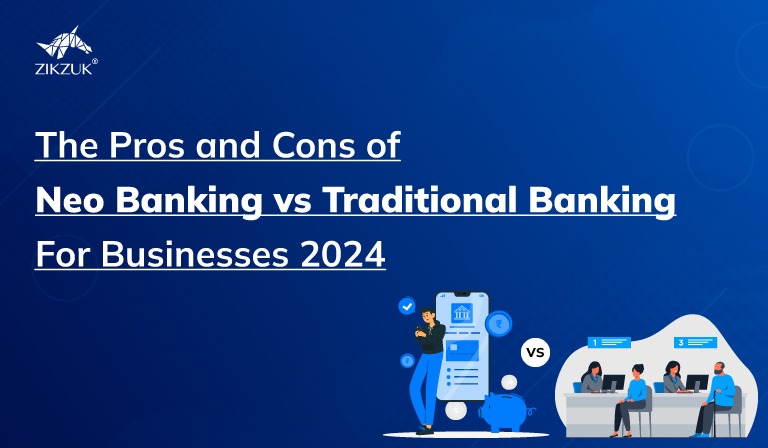In the last few years, the banking industry has witnessed a massive disruption with the emergence of neo-banking. In line with the digital-first era, branchless financial institutions provided a better and more innovative alternative to traditional banks. The rigid processes and limited reach of brick-and-mortar banks gave space for this innovative banking solution. In India, the neo-banking market is expected to reach $183 Bn by 2030 from $48 Bn in 2022, as per the Inc42 report. While traditional banks have been the sole provider of financial solutions for centuries, neo-banks have emerged to challenge the status quo.
In this article, we will explore how neo-banking is different from traditional financial institutions and discuss the pros and cons of each of these models.
What is neo-banking?
Neo-banking is a digital model of offering banking solutions for the modern world through digital-first or digital-only operations. Neobanks do not own or manage physical locations, rather they carry out the entire business through a website or mobile application.
Neobanks offers all the services that a traditional bank offers – payments, savings and current accounts, money transfers, debit and credit cards, loans, and investment options. However, the similarity ends there. In neo-banking, the end-to-end operations happen through digital channels. Even though they do not possess a banking license, they offer legitimate services under the umbrella of e-money institutions. They could also tie up with a traditional bank and offer banking services digitally as an extension.
Neo-banks provide an ideal model for tech-savvy millennials, who don’t want the hassle of going to banks for any financial services. Customers of neo-banks can access all the services online through a user-friendly interface.
Pros of neo-banking
- Offers a convenient way of banking
Neo-banking is a user-centric method of utilizing banking services as it allows you to make transactions, manage accounts, and apply for any financial products right from the mobile app or website at any place and time.
- Faster paperwork processing
Opening a new bank account with neo-banks is as easy as opening an Instagram account, given you have all the right documents. Neo-banking eliminates the need for physical paperwork by managing the entire account setup online.
- Affordable access to banking services
The operating costs of neo-banks are much cheaper than traditional banks. It is primarily because neo-banks don’t have the financial overhead of managing physical locations, facilitating attractive interest rates, and free customer service like zero balance accounts.
- Ability to personalize services
Driven by technology, neo-banking can accommodate the preferences and needs of individual users with ease. It generates deep insights from data analytics to personalize financial services.
- Easy way of doing international transactions
Neo-banking is an affordable option to manage international transactions as it provides attractive currency exchange rates and services at reduced costs.
Cons of neo-banking
- Limited or zero physical footprint
Although branchless banking seems like an innovative approach, it also adds to the disadvantages. A considerable population in India still believes in building a relationship with the bank through in-person interactions.
- Apprehensions over security threats
As it relies on cloud environments to manage the security of your money, it poses cybersecurity threats. Regardless of the number of security policies and practices, neo-banks still have a long way to go in gaining customer trust.
- Significant dependency on technology
As it is entirely driven by technology, all the customer data, money, and other assets are at the mercy of technology. It poses a risk if the system or a workload fails causing widespread panic.
- Uncertain regulations and compliance requirements
Being a very new concept, neo-banking doesn’t have a strong foundation of regulatory and compliance requirements to protect the interests of customers.
What is traditional banking?
Traditional banking is simply a business model where institutes offer financial products and services through their physical branches. Their footprint is spread across the country through a headquarters, regional headquarters, and branches in multiple locations. These banks believe in building a physical relationship or bonding through face-to-face interaction. For the longest time, traditional banks used to play a critical role in governance through their wide access.
Pros of traditional banking
- A wide network of physical locations
Through a wide network of physical locations, traditional banks can provide enhanced customer experience with face-to-face interaction.
- Expanded product/service offerings
The products and services offered by these banks go beyond the trademark offerings of loans, and savings accounts, providing services like mortgages, gold exchange loans, and so on.
- Easy cash withdrawal with ATM network
Traditional banks possess a wide network of ATMs that facilitate easy cash and basic banking services.
Cons of Traditional Banking
- Access to customers stunted
Due to the limitations of launching and managing physical stores, the access of these banks is limited. It is impractical for financial institutions to have a branch in every part of the country.
- High fees for services
Banks are struggling with neo-banking technology because of the cost involved. To offset this earning, banks charge higher service fees from their customers.
- Time-draining banking procedures
Traditional banks are infamous for their long-drawn and frustrating processes for something as simple as opening account processes.
- Restricted technological advances
Several banks in the country are yet to have a fully functional mobile app or digital platform. The lack of expertise and vision could cripple the application of technology.
Conclusion
The financial services industry is still evolving and with the rise of neo-banking, technological advancements have come a long way. With these disruptions changing the face of the financial industry, traditional banks are keen on integrating technological innovations for a better customer experience. Neo-banking is a favorable banking solution for SMEs. ZikZuk is designed to help companies leverage AI/ML capabilities to drive growth and efficiency. Witness its capabilities in a live demo.
